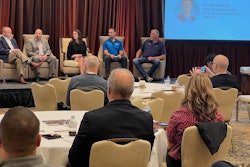
At the time of production on the latest issue, I am in my third month acclimating to my position as editor of Asphalt Contractor, and my crash-course education in this awesome industry. One of the most surprising things, so far, is how at every turn there is a new do much depth of knowledge to learn. It can be overwhelming sometimes for someone like me, so green to it all. Despite those moments where I feel uncertain, two things have propped me up, and helped me keep pushing through.
The first is the openness and willingness of the experts, professionals and contractors to sit on a call with me, sharing the wealth of knowledge they have. Without a doubt I bet I've asked some questions that are considered basic, but not a single person has patronized or made me feel bad for not knowing. The second thing has been the incredible support I have with the team of coworkers and managers.
The people who came before me ensure I don't feel adrift or unsure of what to do next. In early August, at the annual all-company meeting, I saw first hand that the culture here comes from the top. Everyone knows when the culture of a company isn't supportive, and it can mean all the difference when onboarding, as well as, retaining new personnel. That's a key issue in today's labor economy every business owner can appreciate.
In the 14 years I spent in a steel factory, I saw dozens of people "wash out". When I started there, I was just 22 years-old and didn't have a clue. I had a newborn daughter, the economy was in recession, and I just desperately needed a job. It was overwhelming there too, at first. So many types of products, variations in the methods of production, safety concerns, and the list goes on. Most of the time, it felt like you either had to sink or swim on your own. In my situation, I did not have choice. I had to swim. If it were not for a handful of "old-timers" who saw me there, completely out of my depth, and took me under their wing, my chances were not great.
As I reflect on it now, I see there was a significant gap in leadership structure when it came to training. The plan was that there was no plan. I don't make these comments to be ruefully critical or resentful of the people in charge, but to draw out an important point about the differences these sorts of approaches have on outcomes. Today, worker shortages have impacted every corner of industry.
Compared to 2008, the proverbial "shoe" is somewhat on the other "foot". Every employee is more essential, which means that the hours invested in them is doubly as valuable to employers. Who can afford to let them go to waste? Who had that sort of luxury at their disposal? No one I know wants to spend resources on someone that doesn't pan out, and then have to start over from the beginning. A cycle like that can be crippling to production and efficiency, resulting in crucial financial losses.
One way to combat these situations is, of course, by raising wages and improving working conditions. However, even then, more money per hour can't account for being on the job and not feeling confident or safe in what you're doing. People want the sense of satisfaction that comes from doing a job and doing it well. Absolutely no one welcomes the sense that they are standing around, not knowing what to do or how to do it, while feeling their coworkers bare the weight of their inexperience unduly. A large majority of this situation can be avoided by having clear training periods, established goals for new employees, necessary skill checklists to chart gains, and positive reinforcement measures as achievements are made.
More than ever before, the platforms for training are more customizable to specific needs. There's something out there for whatever gap you're looking to bridge, which means workers won't wonder if they'll have to sink-or-swim all on their own. Their success, is your success.


















